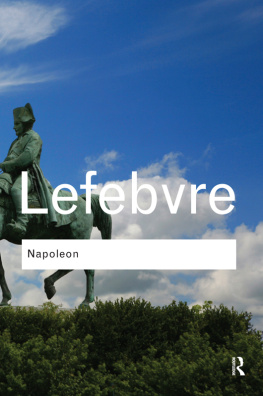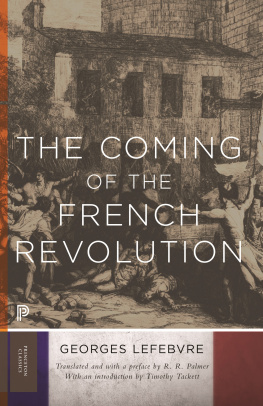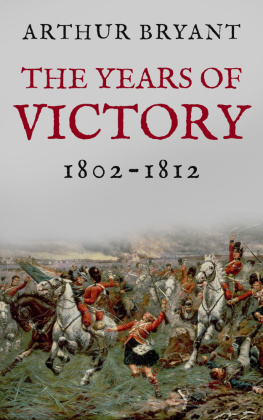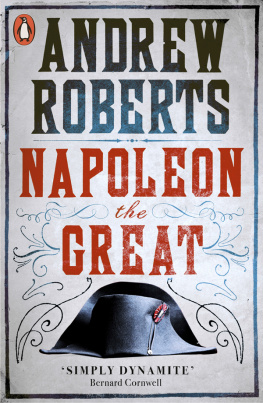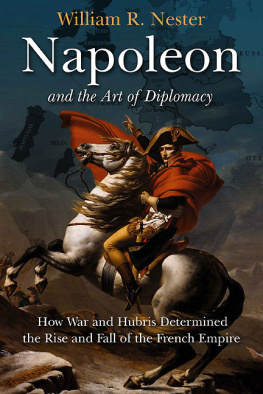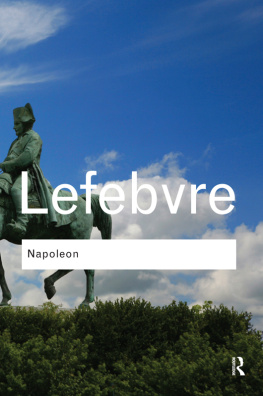Napoleon
Magisterial a biography that is almost as much a personaladventure story as an intellectual treatise.
Andrew Roberts
A penetrating interpretation No one with a serious interest inthe Napoleonic period can afford to ignore it.
Times Literary Supplement

Routledge Classics Contains the very best of Routledge publishing over the past century or so, books that have by popular consent, become established as classics their field.Drawing on a fantastic heritage of innovative writing published by routledge and its associated imprints, this series makes available in attractive, affordable form some of the most important works of modern times.
For a complete list of titles visit
www.routledge.com/classics
Georges
Lefebvre
Napoleon
With an introduction by Andrew Roberts

Napolon originally published in 1935 by Presses Universitaires de Frances
This translation fi rst published in two volumes in 1969 by Routledge Kegan Paul Ltd
Volume 1 translated by Henry F. Stockhold
Volume 2 translated by J. E. Anderson
First published in one volume Routledge Classics 2011
by Routledge
2 Park Square, Milton Park, Abingdon, Oxon OX14 4RN
Simultaneously published in the USA and Canada
by Routledge
711 Third Avenue, New York, NY 10017
Routledge is an imprint of the Taylor & Francis Group, an informa business
Translation 2010 Routledge
Introduction 2009 Andrew Roberts. Reprinted with permission from The Folio Society.
The right of John C. Dressler to be identified as author of this work has been asserted by him in accordance with sections 77 and 78 of the Copyright, Designs and Patents Act 1988.
All rights reserved. No part of this book may be reprinted or reproduced or utilised in any form or by any electronic, mechanical, or other means, now known or hereafter invented, including photocopying and recording, or in any information storage or retrieval system, without permission in writing from the publishers.
Trademark notice: Product or corporate names may be trademarks or registered trademarks, and are used only for identifi cation and explanation without intent to infringe.
British Library Cataloguing in Publication Data
A catalogue record for this book is available from the British Library
Library of Congress Cataloging in Publication Data
Lefebvre, Georges, 18741959.
[Napolon. English]
Napoleon / Georges Lefebvre ; With an introduction by Andrew Roberts.
p. cm. (Routledge classics)
Napolon was originally published in 1935 by Presse Universitaires de Frances; this
translation was fi rst published in two volumes in 1969 by Routledge Kegan Paul, Ltd.
First published in one volume Routledge classics 2011T.p. Verso.
Includes bibliographical references and index.
1. HistoryConsulate and First Empire, 17991815. 2. FranceHistory, Military17891815,
3. Napoleon I, Emperor of the French, 17691821. I. Title.
DC201.L3413 2011
944.05092dc22
[B] 2011003623
ISBN: 9780415610094 (pbk)
ISBN: 9780203828304 (ebk)
INTRODUCTION
There is a paradox that lies at the heart of Georges Lefebvres magisterial biography of Napoleon Bonaparte, published in this fine edition by Folio for the first time as a single volume in English. The author, who held the Chair of the History of the French Revolution at the Sorbonne from 1937 until 1945, was one of the great Marxist intellectuals of the second quarter of the twentieth century; indeed it was he who invented the soubriquet History from below. Yet his two-volume Napolon, first published in 193536 and translated into English in 1969, is emphatically of the Great Man school of history so despised by Marxists. It is pure history from above, and accepts that the actions and will of a single extraordinary man could counteract those of the proletarian masses that Lefebvre himself idolised. So how could this be?
Born to relatively poor parents in Lille in August 1874, Georges Lefebvre attended the local lyce and only matriculated into the University of Lille by means of a series of scholarships that were early testaments to his burgeoning intellect. He became a teacher after graduating in 1898 and began writing in 1904, but it was not until 1925, when he was over fifty, that he published his doctoral thesis, Les Paysans du Nord pendant la Rvolution Franaise. This posited the thesis that it had been the peasantry that ignited, supported and sustained the French Revolution, which he depicted as developing through four distinct phases between the Fall of the Bastille in 1789 and Napoleons Brumaire coup ten years later.
In 1935 the year of the publication of this life of Napoleon Lefebvre was honoured by becoming the president of the Socit des tudes Robespierristes (he admired the Sea-Green Incorruptible for his frugality, integrity and application) and also the director of the Annales Historiques de la Rvolution Franaise, home of the Annales school that was to dominate French historiography. Two years later he was raised to his professorship at the Sorbonne, which he held until his retirement from active teaching in 1945.
The Marxist interpretation which Lefebvre applied to the French Revolution was fully developed in his book Quatre-vingt-neuf, which was published in English as The Coming of the French Revolution in time for its 150th anniversary in 1939, but the Second World War intervened before it could become well known in France. Although Lefebvre survived the German Occupation, Quatre-vingt-neuf was banned by the Vichy regime, and its initial print run of eight thousand copies was burned. After the war, the two volumes of his history of the Revolution before and after 1793, with their concentration on dialectical materialism as the central explanation for its causes and course, were published in 1951 and 1957. These books, utterly dominant in their day, sought to impose a classical Marxist dialectic on the French Revolution, whereby the monarchy and nobility were initially overthrown by the bourgeoisie and clergy, who were themselves toppled by the workers and peasants, a conceptual framework that has since been comprehensively deposed by successive waves of revisionists. Lefebvre died in Boulogne-Billancourt on the outskirts of Paris on 28 August 1959.
In Pieter Geyls historiographical masterpiece Napoleon: For and Against, published in 1949, the final chapter was devoted to Lefebvres life of the emperor, which was lauded as free from parti pris. He has an eye for the positive achievements and above all he can appreciate the greatness of the figure He writes vividly and to the point and shows himself a man of imagination The portrait as a whole shows a remarkable tact and a fine balance. This encomium still stands. Geyl was impressed by the way that although Lefebvre pointed out that Napoleon was indeed bent on world domination,
The beauty of Lefebvres book consists in the fact that he is able to present, and continually to recall, this general vision upon Napoleon and his regime, without neglecting the endless multiplicity of facts which determine and modify each particular instance. English imperialism, Austrian reaction, the personal policy of [Tsar] Alexander, none of these is blurred in order to make Napoleon stand out with more sharpness.
Lefebvre criticised Napoleons hatred of free speech and his willingness to close down newspapers that indulged in it too freely, but this may well have reflected the authors contemporaneous view of Adolf Hitler, who had been Chancellor of Germany for two years by the time of the publication
Next page
